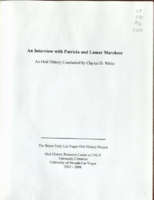Search the Special Collections and Archives Portal
Search Results

Jahaira Farias interview, April 12, 2019: transcript
Date
Archival Collection
Description
Interviewed by Monserrath Hernández and Barbara Tabach. Jahaira Farias is a graduate of Western High School, a Marine Corps veteran, and a founder of a local chapter of the Women Marines Association. At the time of this oral history, Jahaira worked for US Congresswoman Susie Lee. Jahaira Farias was born in Las Vegas, Nevada, and grew up on the west side of town. She has summertime memories of her travels to Mexico, where she was able to connect with her family's heritage and language. During her years at Western High School, she participated in varsity sports and was the armed drill team commander. After graduation, Jahaira enlisted into the Marine Corps, where she specialized as a transport operator and hazardous material transporter and served two deployments in Iraq and Afghanistan. Her transition to civilian life included work in security at Caesars Palace. When she took a position with as district representative for Congresswoman Susie Lee, her focus was to assist veterans and immigrants. She helped Rep. Lee develop community outreach towards the Latinx community and Veterans. Jahaira is the president of the Las Vegas NV-3 Sagebrush Marines chapter of the Women Marines Association, an organization she helped establish and rebuild. The WMA helps veterans find their footing again through mentoring and support, and conducts community engagement by fostering the same camaraderie found in the Corps. After surviving a motorcycle accident, Jahaira's recovery is nothing short of miraculous, going from being in a wheelchair to competing in Tough Mudder. Now extremely active, Jahaira is an avid hiker and certified yoga instructor, specializing in trauma recovery. A polyglot, Jahaira formally studied Arabic and Russian, and speaks English, Spanish, and Pashto, and received an associate degree in Russian from the College of Southern Nevada.
Text

Floyd Jenne interview, 1996: transcript
Date
Archival Collection
Description
Jenne discusses his birth in Ogden, Utah in 1915, his early life in Northern Nevada in 1920s, and his later life in Boulder City, Nevada working as a reclamation ranger for the Bureau of Reclamation. Jenne begins the interviews discussing his work as a steel foundry worker and miner in McGill, Nevada, studying forestry, and enlisting in the Civilian Conservation Corps at Utah State University in 1934. Jenne then describes his experiences moving to Boulder City and working as a reclamation ranger. Other topics Jenne covers include providing security for notable Boulder City and Hoover Dam (Boulder Dam) visitors and patrolling the area. Lastly, Jeanne talks about the Boulder City Junior Chamber of Commerce, Boulder City's incorporation, and Boulder City law enforcement.
Text

Transcript of interview with Mazie Martin Jones by Jane P. Kowalewski, November 3, 1978
Date
Archival Collection
Description
On November 3, 1978, Jane P. Kowalewski interviewed Mazie Martin Jones (born in Las Vegas, Nevada) about her father, Doctor Roy Martin, the first doctor to own a private practice in Las Vegas. Jones explains how her father first arrived in Nevada and his different investments in real estate, hospitals, and hotels. She goes on to explain her father’s hotel pursuits after retiring from medicine in the late forties.
Text

Transcript of interview with Carl F. Kelley by James M. Greene, May 2, 1972
Date
Archival Collection
Description
On May 2, 1972, James M. Greene interviewed Carl F. Kelley (born May 19th, 1922 in Ohio) about his life in Southern Nevada. The two talk about how Kelley first moved to Nevada and his original addresses. Kelley describes living in Boulder City, Las Vegas, and Henderson. The interview concludes with an in-depth discussion of the Civilian Conservation Corps activities in Boulder City, Nevada.
Text

Transcript of interview with Phyllis Webb Clark by Lorna Suzette Clark, April 7, 1976
Date
Archival Collection
Description
On April 7, 1976, Lorna Suzette Clark interviewed her mother-in-law, Phyllis Webb Clark (born 1928 in Los Angeles, California) about her experiences from living in Las Vegas. The two first discuss education, the various address at which Phyllis lived, and the early development of the Strip and Downtown areas. The interview then covers the visits of important individuals, forms of transportation, the effect of World War II on the economy, and the effects of the growing town on hospitality and courteousness. Phyllis also mentions the Helldorado Parade, her involvement in Boy Scouts and Girl Scouts, and recreational activities. The interview concludes with a discussion on the atomic testing, the Stewart Ranch, and floods in Las Vegas.
Text

Transcript of interview with Oliver Crickman by William Hawley, March 3, 1979
Date
Archival Collection
Description
On March 3, 1979, William Hawley interviewed Oliver Crickman (born 1933 in Apex, North Carolina) about his experiences from living in Nevada and working in restaurants. Crickman first describes his background and his first occupations prior to starting as a cook in Las Vegas restaurants. He then explains how he gradually moved from the position of cook’s helper to sous chef and his then-current position of executive chef at the Royal Inn. Crickman goes into detail about the operation of those restaurants and other Las Vegas Strip and Downtown Las Vegas properties, and he describes the demographics of cooks as well as how the hospitality industry has changed over time. The latter part of the interview involves a discussion of Crickman’s various residences in Las Vegas over time, the extent of crime, the first places to shop, and a brief discussion on mobile homes.
Text

Transcript of interview with Ruth and Jake Dieleman by James M. Greene, November 15, 1974
Date
Archival Collection
Description
On November 15, 1974, James M. Greene interviewed Ruth Dieleman (born 1908 in Searchlight, Nevada) and her husband Jake Dieleman (born 1904 in Axel, Netherlands) about their lives in Southern Nevada. Ruth first talks about her life in Searchlight while growing up, her experience as an educator, and her various residences in Southern Nevada. Jake first talks about his immigration into the United States and his eventual move to Nevada to get into construction rigging for the building of Hoover Dam. He discusses his work as a rigger in detail but also discusses his work on various Las Vegas casinos as well as his work in the state legislature.
Text

Transcript of interview with Sam Earl by Laura Button, March 9, 1981
Date
Archival Collection
Description
On March 9, 1981, Laura Button interviewed Sam Earl (born 1912 in Virgin, Utah) about his life in Nevada. Also present during the interview is Sam’s wife, Melissa Earl. The three discuss a wide range of topics from the early development of Las Vegas, Sam’s work on the Boulder Dam, the Earls’ early residence in a tent, and the family’s religious participation. The interview also covers gambling, Block 16, the first members of the police force, recreational activities, and the Helldorado parade. Sam also talks about his work as a building contractor, including some of the buildings and casino properties he helped build, and the interview moves to a discussion of the development of the Las Vegas Strip. The interview concludes with Sam’s description of his work as a truck driver and a discussion on welfare benefits.
Text

Transcript of interview with Myoung-ja Lee Kwon by Claytee White, September 4, 2004
Date
Archival Collection
Description
Myoung-ja Lee Kwon began her life on the grounds of the Kyongbok Palace in Korea. In a country where education is valued, her father's occupation as a university professor meant that the family was highly honored, thus this palatial space allowed them live in a state of prosperity. But war changed these circumstances and in this interview Kwon vividly explains the family's evolution. In 1965, after graduation from Seoul National University she married and a year later, moved to the United State of America where she earned a Master's degree in Library Science in Provo, Utah. Her first professional position was at the University of Nevada Las Vegas as a cataloguer and after many promotions, became interim dean of UNLV Libraries. In 2001, she took the job as Dean of Libraries at California State East Bay Library, retiring in 2008. Currently, she serves as a special lecturer and discussion leader with the Fulbright Senior Specialist Program. During her 2009 visit to Korea, she pr
Text

Transcript of interview with Pat and Lamar Marchese by Claytee White, January 16, 2008
Date
Archival Collection
Description
Pat Marchese grew up in Johnston, Pennsylvania, and Lamar was reared in Tampa, Florida. Pat was raised on a farm surrounded by relatives. Lamar takes pride in his mother heritage, which can be traced to Tampa Bay, Florida, in the early 1840's. Pat and Lamar graduated from the University of South Florida and relocated to Las Vegas in 1972. Pat's remarkable 30-plus year passion includes working for the city of Las Vegas and Clark County, Nevada. She created numerous art and cultural programs which consist of the Civic Symphony, Charleston Heights Arts Center, Rainbow Company Theatre, along with consulting work for the Allied Arts Council. In addition, to her creating art and cultural agendas, she became a budget analyst and chief lobbyists for the county, testifying before the Senate Taxation Committee. She implemented through the public arts program, a Mural Arts Series, the Parks and Recreation Cultural Division, and culture on the Strip. Pat executed the grant that ensured the necessary funding for the expansion for public broadcasting radio stations throughout California, Utah, Arizona and Nevada. She's certainly worthy of her title "Queen of Las Vegas Culture". Lamar's amazing 30-plus year's calling comprises putting into action an abundant number of libraries programs for the State of Nevada along with establishing the first public broadcast radio station in Nevada. His library accomplishments include merging the City's libraries branches, library programs, shows, concerts, unification of academic libraries and public libraries and the first reciprocal borrowing agreement for the State of Nevada with the Nevada library card. He consolidated Las Vegas Libraries and the Las Vegas Clark County Library District. He also sold bonds for the development of future libraries. Lamar's broadcasting achievements consist of incorporating the Nevada Public Radio Corporation with State of Nevada, serving as Chairman of the board for NPRC, constructing broadcasting translators and radio stations throughout the tri-state and enveloping the State of Nevada through public broadcasting. Combined, Pat and Lamar Marchese have served the Las Vegas community for over six decades. Thanks to the Marcheses, broadcasting is thriving throughout the tri-state area, libraries are blossoming and cultural programs are flourishing. They are looking forward to retiring, traveling, spending time with loved ones, and most of all, Pat and Lamar time together.
Text
